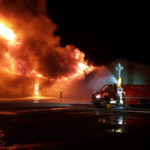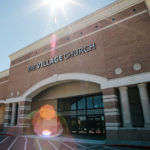During a time of high inflation and supply chain disruptions, church building consultants advise congregations involved in construction projects to seek professional guidance, plan early and practice patience all along the way.
“Planning always is important. Now, it’s even more important, and it needs to be done further in advance,” said Cal Todd, consulting director with VisionBridge Consulting, a firm based in The Woodlands that helps churches and other nonprofit organizations with construction projects.
The Baptist General Convention of Texas contracts with VisionBridge to respond to the architecture needs of Texas Baptists’ churches, associations and institutions.
“Be ready to exercise patience in the process,” said architect Mark Todd, president of VisionBridge.
Some supply chain disruptions may be unavoidable, and they can cause delays of weeks or even months. In some cases, a church may pay additional fees to expedite delivery, in order to stay on schedule and avoid paying labor costs while waiting.
“It’s a balance of cost and time that churches need to consider,” Cal Todd said.
Avoid delays due to lack of planning
Altered schedules due to supply chain issues may be inevitable, but costly delays caused by lack of planning and preparation by churches can be avoided, the consultants emphasized.
“Every church needs a master plan,” Mark Todd said. “We don’t recommend that churches spend money on a full set of construction drawings at the beginning of the project. But they need a schematic drawing.
“A key element is to have a clear understanding of what the project could cost. A preliminary schematic design is enough to provide a good idea for a general budget.”
Sign up for our weekly edition and get all our headlines in your inbox on Thursdays
The days of a committee sketching out a plan on graph paper and handing it to a contractor are long gone, Cal Todd said. A committee could spend months developing a design, only to discover the proposed plan violates multiple building codes.
“Don’t feel like you need to go it alone. Get professional help early,” he said.
Scott Moore, ministry consultant at VisionBridge, noted many small communities that once had few regulations governing construction now take a hands-on approach to ensure code compliance.
In addition, churches may need to meet requirements imposed by utility districts, economic development districts and other special-use districts. So, congregations can save time and money by seeking professional guidance early in the process.
Aim for consistent progress
Careful planning and expert guidance also can help churches expedite the construction process by careful scheduling of various steps in the process simultaneously, Cal Todd said.
“A lot can happen at the same time rather than in a linear fashion,” he said. “There are overlapping steps that can be taken.”
If crews involved in the construction process don’t have to wait for a committee to meet or for a congregation to approve the next step, it can save the church money, Mark Todd said.
“We strongly encourage consistent progress,” he said. “It can save the church a large percentage of the overall cost—somewhere in the 5 percent to 10 percent range—if they plan ahead and focus on making consistent progress.”
While inflation results in overall material cost increases, the prices of wood and steel especially are continuing to rise dramatically, Moore noted.
“Metal prices—particularly steel—are changing daily,” he said.
Moore urges churches to be flexible and not become frustrated when delays occur.
“Be aware that no matter how long you think it will take, it probably will take a lot longer,” he said.
Be flexible and don’t wait for a price drop
In addition to being flexible about schedule and price, VisionBridge consultants also counsel churches to be flexible regarding financing.
“There’s a real danger in insisting on paying cash for everything,” Mark Todd said. “The money raised can’t keep up with inflation. It’s good for churches to be open to multiple ways to fund a building project.”
Even though costs are significantly greater now than a few years ago, VisionBridge does not counsel congregations to wait for prices to decrease.
“If you have prepared and planned and there is a need, don’t wait,” Cal Todd said. “We don’t foresee any big price drop in the next 12 to 18 months. We certainly don’t expect the prices to go back to pre-pandemic levels anytime soon. There are signs there may be some stabilization of prices, but not a significant drop in costs.”
Every building project involves stepping out by faith to some degree, Mark Todd said. He urges churches to recognize when they are poised for growth and to plan accordingly.
“A church already may be experiencing a wave of success and approaching full capacity in its building. If they start to think about a building project at that point, they’re already behind,” he said.
“A church can miss that wave of success if it waits too long. A church needs to have a sense of what is happening in its community and a master plan for the future.”














We seek to connect God’s story and God’s people around the world. To learn more about God’s story, click here.
Send comments and feedback to Eric Black, our editor. For comments to be published, please specify “letter to the editor.” Maximum length for publication is 300 words.